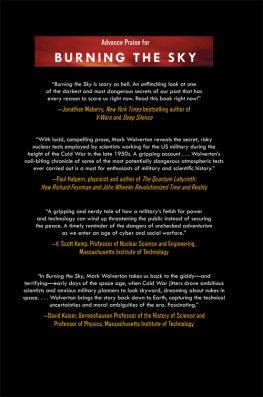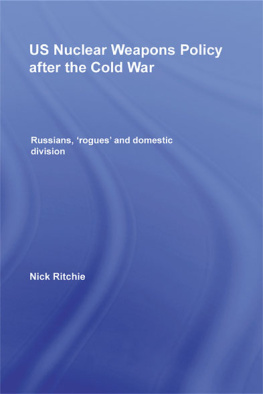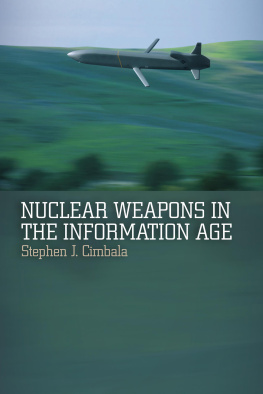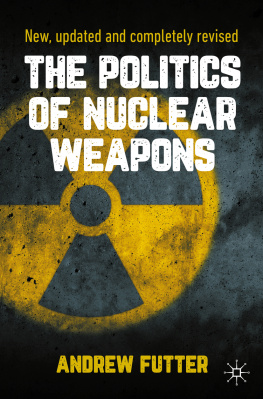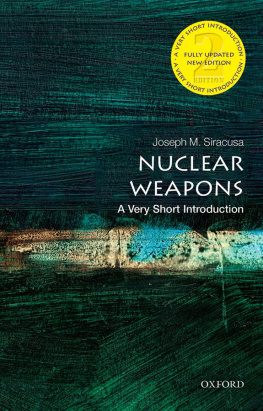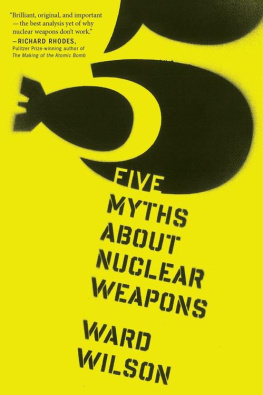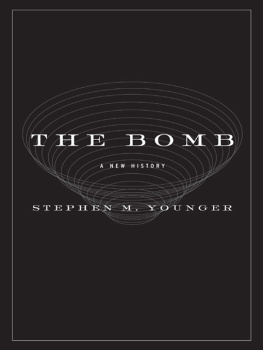Mark Wolverton - Nuclear Weapons
Here you can read online Mark Wolverton - Nuclear Weapons full text of the book (entire story) in english for free. Download pdf and epub, get meaning, cover and reviews about this ebook. year: 2022, publisher: MIT Press, genre: Politics. Description of the work, (preface) as well as reviews are available. Best literature library LitArk.com created for fans of good reading and offers a wide selection of genres:
Romance novel
Science fiction
Adventure
Detective
Science
History
Home and family
Prose
Art
Politics
Computer
Non-fiction
Religion
Business
Children
Humor
Choose a favorite category and find really read worthwhile books. Enjoy immersion in the world of imagination, feel the emotions of the characters or learn something new for yourself, make an fascinating discovery.

- Book:Nuclear Weapons
- Author:
- Publisher:MIT Press
- Genre:
- Year:2022
- Rating:4 / 5
- Favourites:Add to favourites
- Your mark:
- 80
- 1
- 2
- 3
- 4
- 5
Nuclear Weapons: summary, description and annotation
We offer to read an annotation, description, summary or preface (depends on what the author of the book "Nuclear Weapons" wrote himself). If you haven't found the necessary information about the book — write in the comments, we will try to find it.
Nuclear Weapons — read online for free the complete book (whole text) full work
Below is the text of the book, divided by pages. System saving the place of the last page read, allows you to conveniently read the book "Nuclear Weapons" online for free, without having to search again every time where you left off. Put a bookmark, and you can go to the page where you finished reading at any time.
Font size:
Interval:
Bookmark:
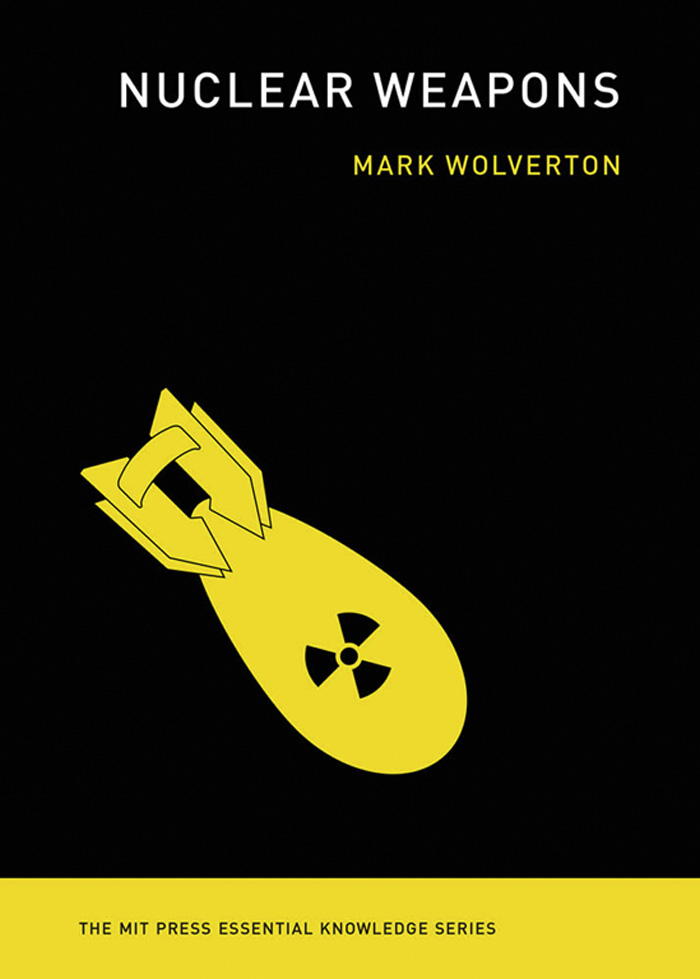
The MIT Press Essential Knowledge series
A complete list of the titles in this series appears at the back of this book.
Mark Wolverton
The MIT Press | Cambridge, Massachusetts | London, England
2022 Mark Wolverton
All rights reserved. No part of this book may be reproduced in any form by any electronic or mechanical means (including photocopying, recording, or information storage and retrieval) without permission in writing from the publisher.
The MIT Press would like to thank the anonymous peer reviewers who provided comments on drafts of this book. The generous work of academic experts is essential for establishing the authority and quality of our publications. We acknowledge with gratitude the contributions of these otherwise uncredited readers.
This book was set in Chaparral Pro by New Best-set Typesetters Ltd.
Library of Congress Cataloging-in-Publication Data
Names: Wolverton, Mark, author.
Title: Nuclear weapons / Mark Wolverton.
Description: Cambridge, Massachusetts : The MIT Press, [2021] | Series: The MIT Press essential knowledge series | Includes bibliographical references and index.
Identifiers: LCCN 2021010580 | ISBN 9780262543316 (paperback)
Subjects: LCSH: Nuclear weaponsHistory. | Deterrence (Strategy)
Classification: LCC U264 .W65 2021 | DDC 355.8/2511909dc23
LC record available at https://lccn.loc.gov/2021010580
10 9 8 7 6 5 4 3 2 1
d_r0
The MIT Press Essential Knowledge series offers accessible, concise, beautifully produced pocket-size books on topics of current interest. Written by leading thinkers, the books in this series deliver expert overviews of subjects that range from the cultural and the historical to the scientific and the technical.
In todays era of instant information gratification, we have ready access to opinions, rationalizations, and superficial descriptions. Much harder to come by is the foundational knowledge that informs a principled understanding of the world. Essential Knowledge books fill that need. Synthesizing specialized subject matter for nonspecialists and engaging critical topics through fundamentals, each of these compact volumes offers readers a point of access to complex ideas.
Since their birth into a war-ravaged world in 1945, nuclear weapons have been part of our world, fears, politics, and the fabric of our culture. At first they were exotic, mysterious, and terrifying, and then a constant threat throughout the many years of the Cold War. But now in the twenty-first century, theyve become almost mundane, boring, and irrelevantsomething most folks rarely even think about, much less worry about or fear.
Yet they continue to exist, they still pose an existential threat, and even if the prospect of ultimate doom they once represented has greatly receded (though hardly disappeared), in some very real ways they pose greater dangersand a greater likelihood of being usedthan during the Cold War. And with all that, they remain as mysterious and misunderstood as when they were brand new, and perhaps even more shrouded in misconceptions and ignorance as to their true nature and capabilities, with a public whose awareness and knowledge derives more from movies and TV shows than from actual fact.
This book is an attempt to remedy that unfortunate disconnect between common perceptions and reality, between the Bomb as a cultural icon and the hard truth of the thousands of nuclear weapons that still, at this moment, rest in missile silos, storage bunkers, submarines cruising the oceans, the wings and bomb bays of airplanes, and nameless secret places, ready and patiently waiting for the moment they will be called to terrible action.
If nuclear weapons are ever again used, they may not directly affect more than a relative handful of people (though a handful measured in the thousands), but the indirect effects will shake the foundations of every facet of human society. Thats why its important for everyone to have a basic understanding of nuclear weapons: what they are, how and why they originated, the history of attempts to control, limit, and possibly use them, and the prospects for eliminating them completely or at least learning to live with them.
The subject of nuclear weapons is vast and complex, encompassing not just the obvious disciplines of physics and military strategy but also including politics, sociology, psychology, and nearly every form of popular culture. Its impossible to do it all justice in a slim volume such as this one, and in the pages that follow, I wont even try. Instead, my intention is to give the reader a general overview of the subject, including an understanding of the basic scientific facts, some historical perspective, and an appreciation of the unique political, social, and moral dilemmas that surround it all. I also hope to provide a beginning framework for those who wish to pursue individual aspects of this broad subject in greater depth by pointing the way to further resources to consider and explore.
Talk of things such as deterrence theory, fission-fusion warheads, counterforce versus countervalue targeting, and isotope separation can seem hopelessly technical as well as esoteric to the average person whos simply trying to live a happy, peaceful, and productive life without thinking about the prospect of some terrible nuclear doomsday. Its an understandable feeling, and I certainly dont recommend to anyone a full-time mental diet of obsessing about the end of the world.
Yet the unfortunate truth is that far from being a thing of the past, remnant of history, or lurid fictional plot device, nuclear weapons remain an issue that involves every human being. That includes not only every citizen of the worlds current nuclear powers but those in the most remote corners of the globe too, from the poles to the tiniest Pacific island. Everyone born since the dawn of the nuclear age has already been physically affected, however subtly and indirectly, by nuclear weapons, as the isotopic by-products of 520 open-air bomb tests have spread over the entire planet to settle in the earths biosphere, whether deep in our bone marrow, our plants and water, or even our table wines. And the presence of nuclear weapons in the world has profoundly influenced our political and economic structures, our military strategies and tactics, the ways in which nations interact, cooperate, and conflict with each other, and our individual and collective culture and consciousness, all the way down to our everyday vocabularies, imagery, and the nightmares that haunt our sleep.
This book is an attempt to provide a primer for understanding a world with nuclear weapons so that you can better understand the next politician arguing to abandon a treaty or adopt a new weapons system; distinguish legitimate dangers from political rhetoric, scaremongering, and saber-rattling, and appreciate the true meaning of flippant remarks about nuking an enemy. Most of us dont like to spend much, if any, time thinking about nuclear warfare or terrorism. But sometimes its necessary to do so, and at such times, a clear understanding of the subject is important, not only so we can ensure that the leaders who speak and act for us are preserving our safety instead of leading us to disaster, but to calm our own dark, human fears. Because while it may not be our fingers on the nuclear buttons, we all have a profound stake in what happens if those buttons are ever pushed.
This project would never have happened were it not for the enthusiastic support of my editor at the MIT Press, Jermey Matthews. Haley Biermann of the MIT Press patiently endured my endless questions. And of course, my brilliant agent, Michelle Tessler, brought it all together. Many thanks to you all.
Next pageFont size:
Interval:
Bookmark:
Similar books «Nuclear Weapons»
Look at similar books to Nuclear Weapons. We have selected literature similar in name and meaning in the hope of providing readers with more options to find new, interesting, not yet read works.
Discussion, reviews of the book Nuclear Weapons and just readers' own opinions. Leave your comments, write what you think about the work, its meaning or the main characters. Specify what exactly you liked and what you didn't like, and why you think so.

